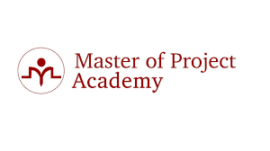
Scrum is a widely used Agile project management framework. As one of the most popular Agile methodologies, Scrum is commonly used by software development teams; however, it can be applied to any industry. Organizations that use the Scrum framework benefit from higher productivity, improved product quality, reduced risk and happier team members.
The Scrum framework requires three key team roles, including the Product Owner, the Scrum Master and the development team. The certified Product Owner and Scrum Master roles are often sought after by aspiring Scrum leaders who wish to lead teams to project success. And if you’re one of them, you must consider obtaining a Scrum certification.
There are many Scrum certifications out there to choose from, depending on your goals. Here, we break down some of the best certifications available to you.
There are many benefits to earning a Scrum certification. First, certification provides the knowledge you need to lead teams through successful initiatives. In addition, many organizations looking to take advantage of Scrum are searching for certified Scrum Masters and Product Owners to fill open roles. Obtaining a certification can help you remain competitive in your job search or solidify your place in your current organization. You will also learn how to apply the Scrum techniques to project management tools such as Kanban boards.
The Agile Scrum Certification by Master of Project Academy is designed to teach Agile and Scrum project management foundation. The course is designed to be easy-paced, so you can complete the training even if you are working full-time.
There are no specific qualifications needed; however, it is recommended that the candidates have some knowledge of and experience with Scrum and Agile methodologies.
The training is 10 hours long and consists of 150+ practice questions to help prepare for certification exams. There is no exam in this course, though there is a sample Agile Scrum certification exam.
You can choose from different types of subscriptions ranging from $67 for a monthly subscription to $527 for lifetime access.
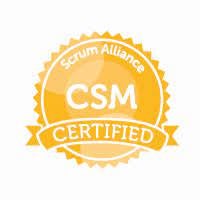
The Certified ScrumMaster (CSM) certification is considered to be the gold standard. This certification was developed for those new to Agile as well as the more seasoned, including software engineers and project managers.
During the certification course, you’ll learn everything there is to know about the Scrum framework, including Scrum theory and how to plan sprints. Once you complete the CSM certification, additional courses are available such as the Advanced Certified ScrumMaster certification course.
CSM is an introductory course for aspiring Scrum Masters and individuals that are already leading Scrum teams. Therefore, there are no eligibility criteria or experience required for CSM certification.
The Certified ScrumMaster (CSM) by Scrum Alliance training which runs for two days is estimated to be around 16 hours. The duration of the certification exam is two hours. The format of the exam is 50 multiple-choice questions.
The cost of Certified ScrumMaster (CSM) by Scrum Alliance certification is between $405 and $695, depending on date, time, and instructor. There is also a $25 charge for each additional attempt at the exam.
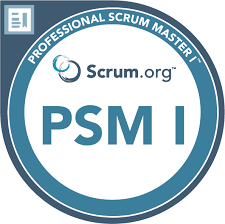
Scrum.org offers three levels of Professional Scrum Master: PSM I, PSM II and PSM III. The Professional Scrum Master certification solidifies your knowledge of the Scrum framework and how it’s used. While the Professional Scrum Master I certification is perfect for Scrum beginners, PSM II and PSM III are best for those with more advanced skills.
Scrum.org offers the Professional Scrum Master certification exams to professionals with or without previous Scrum training. However, they also offer training courses for those just getting started with Scrum. PSM I is required to obtain the PSM II and III certifications.
There are no formal eligibility criteria or required skills to obtain the Professional Scrum Master (PSM) by Scrum.org. However, you must have completed the previous level of PSM to progress to the next. For example, to get the PSM III certification, you must have completed PSM I and PSM II.
The skills taught in this certification depend on the level of the program:
The training lasts for two days and goes for eight hours each day for a total of 16 hours of training. The format and duration of the exam depend on the level of the program. The duration varies from 60 to 150 minutes, and the number of questions varies from 30 to 150.
The cost of training depends on the level of the program. It varies from $150 to $500.
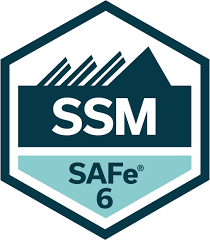
The Scaled Agile Framework (SAFe) is a leading framework for scaling Agile according to Gartner. SAFe is provided through Scaled Agile, which also provides the SAFe Scrum Master (SSM) certification for SAFe-specific organizations.
During the training course, you’ll learn how to lead Agile teams in a SAFe environment, how to conduct iteration planning and more. Once you complete the training program, you’ll be prepared to take the SAFe Scrum Master certification exam, which is best for those with intermediate-level skills.
There is no formal requirement for the SAFe Scrum Master (SSM) by Scaled Agile; however, it is recommended that the candidate has basic Scrum and Agile experience.
The training takes place over the course of two days, lasting eight hours each day for a total of 16 hours of training. The exam for SAFe Scrum Master (SSM) by Scaled Agile consists of 45 multiple-choice questions, and the duration is 90 minutes.
The cost of training depends on several factors, including location and mode of delivery. You can expect the SAFe Scrum Master (SSM) by Scaled Agile training and certification to cost between $500 to $2000.
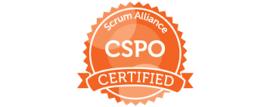
The Certified Scrum Product Owner (CSPO) certification is for those wanting to learn how to bring new products to life. During this course, Product Owners, project managers and other Agile team members can dive deeper into the Scrum framework as well as the principles required for success.
The CSPO certification is one of the most popular options for Product Owners simply due to its benefits. For example, according to a survey completed by Indeed, 39% of the CSPO-certified Product Owners stated that the certification helped them achieve a higher salary.
The Certified Scrum Product Owner (CSPO) by Scrum Alliance does not have specific required skills.
There is no exam required to earn a Certified Scrum Product Owner (CSPO) certification.
Expect to spend around $399-$780 for training and certification for the Certified Scrum Product Owner (CSPO) by Scrum Alliance. There is also a $100 certification fee paid upon the successful completion of the program.
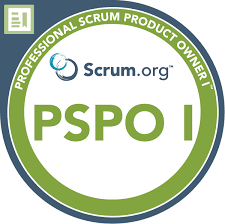
The Professional Scrum Product Owner (PSPO) certification is similar to the PSM certification as there are three distinct certifications depending on your skill level: PSPO I, PSPO II and PSPO III.
This certification is built on the professional Scrum competencies, including understanding the Scrum framework, developing teams and managing products from plan to launch. PSPO I is required to be able to obtain the PSPO II and III certifications.
There is no specific eligibility criteria or required skills for the Professional Scrum Product Owner certification. However, each level of the PSPO builds on the previous level, so you will need to pass each level to proceed.
The entry-level PSPO I has two days or 16 hours of live training. The duration and format of the exam depend on the level of certification. The exam for the PSPO ranges from 60 minutes to 90 minutes, depending on the certification level.
The Professional Scrum Product Owner certifications are typically priced between $1000 to $1500. You also have a test attempt fee in the range of $200 to $500, though the training course includes a free attempt at the exam.
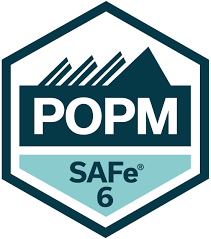
The SAFe Product Owner/Manager (POPM) certification is specifically for Product Owners who wish to learn how to build products using the Scaled Agile Framework. Inside the course, you’ll learn how to thrive in your role as a Product Owner, how to test projects and how to collaborate with others on your Scrum team.
Candidates for the SAFe Product Owner/Manager must have attended a SAFe PO/PM or LEADIng SAFe course. If they don’t fulfill this requirement, then they must have a minimum of one year of experience in a PO/PM role in a SAFe environment.
The training duration for this certification is two days. The duration of the SAFe Product Owner/Manager (POPM) exam is 90 minutes. It consists of 45 multiple-choice questions.
The cost of the SAFe Product Owner/Manager (POPM) ranges from $1000 to $1500 depending on the instructor, location, study materials and other factors.
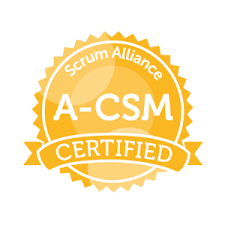
The Advanced Certified ScrumMaster (A-CSM) is an advanced and immersive course for the Scrum Master role. The program is designed to use real-world examples and encourage a collaborative learning experience. The course teaches attendees practical tools and techniques that can be applied to their work.
The candidate must meet all the following requirements for the Advanced Certified ScrumMaster:
The training takes place over the course of two days, lasting eight hours each day for a total of 16 hours of training. There is no exam for the Advanced Certified ScrumMaster (A-CSM).
The cost of training for the Advanced Certified ScrumMaster (A-CSM) varies from $1000 to $2000 depending on availability, location, instructor and other factors.
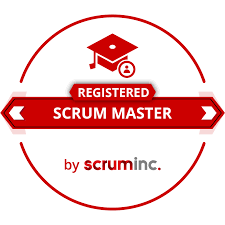
The Scrum Master by Scrum Inc. (RSM) is developed by the co-creator of Dr. Jeff Sutherland. The course is designed to be highly interactive and includes a variety of exercises and games. Attendees will get to experience the Scrum Master role first-hand. This includes how to create a product backlog and manage a burndown chart.
There are no prerequisites or specific eligibility criteria for the Scrum Master by Scrum Inc (RSM).
The Scrum Master by Scrum Inc. (RSM) is a two-day course including training and certification. There is no separate exam for this certification. However, the attendees must demonstrate their understanding and knowledge of Scrum and their ability to apply their learning to their work.
The Scrum Master by Scrum Inc. (RSM) certification costs range from $1200 to $2000.
Scrum certifications provide attendees with the knowledge, hands-on experience and confidence to apply Scrum techniques and frameworks to their work. Here are some of the key benefits of scrum certifications in project management:
With Scrum certification, you get a solid knowledge base of core Scrum principles and best practices. This helps you to guide teams and remove impediments in various situations. This can help you boost your team’s effectiveness.
One of the major goals in project management is to anticipate problems and events before they occur. With Scrum certification, you will strengthen your risk-assessment skills. This will help you eliminate any impediments or bottlenecks that threaten to stall your project.
Whether you are a project manager, IT professional or business executive, you can prepare yourself for more career opportunities with Scrum certifications. It can also increase your earning potential and make your résumé stand out.
Scrum certifications teach you skills and tools that enable you to improve project outcomes by applying Scrum learning. This is achieved through better management of processes, enhanced collaboration and communication, and increased productivity.
As mentioned above, getting Scrum certifications in project management offers several benefits. However, you need to choose the right program to fully benefit from Scrum certification. Fortunately, there is a variety of certifications to choose from. To pick the best Scrum certification for project management, you need to evaluate your current needs, experience level and future goals.
If you are new to the Scrum methodology and want an introduction to the framework, you will be better suited to choose a basic certification program. On the other hand, if you already have experience with Scrum, you can choose a more advanced certification program. There are some certifications that offer multiple levels of training, providing a clear progressive path from basic to advanced level.
This list of best Scrum certifications was compiled through extensive research and analysis of several certifications. We looked at the different parameters, including the usefulness of the certification and skills taught in the program.